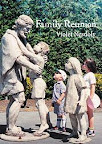
Title: Just Jane
Author: Nancy Moser
Publisher: Bethany House, September 2007
Genre: Historical fiction
ISBN: 0764203565
I scratch out the words, dip my pen into the well of ink, and try again. It is not the first time I have scribbled and scratched, obliterating one word or phrase for another….
Aha!
I quickly put pen to paper, eager to capture the phrase before it returns to hiding: It is a truth universally acknowledged…that a single man in possession of a good fortune, must be in want of a wife.
These are the words that introduce us to the world of Nancy Moser’s newest historical fiction Just Jane. It is a pastoral, slow-paced world where family members keep up with each other by writing letters and paying extended visits. It is a world where men call the shots while women keep house and have babies, where women marry more for practicality than love, and where a girl without much wealth isn’t much of a catch. It is the world of Sense and Sensibility and Pride and Prejudice as lived by their creator, Jane Austen.
What struck me first about the book was the style in which Moser chose to write it. She has Jane telling her own story (first person, present tense) in the language of the day. I wasn’t sure how I would handle 350 pages of:
Our journey proceeds exceedingly well; nothing occurs to alarm or delay us. We find the roads in excellent order, have very good horses all the way… etc.
But the strangeness soon wore off and I hardly noticed it, except with appreciation at the parts where the archaic style sets off Jane’s wit and sarcasm brilliantly:
“I nod to the Miss Maitlands, who are both prettyish, with brown skin, large dark yes, and a good deal of nose. The general has got the gout, and Mrs. Maitland the jaundice. Miss Debarie, Susan and Sally are all in black but do not carry off such severity well. I am as civil to them as their bad breath allows.”
All that to say that the book shone in the characterization department . Moser portrays a convincing Jane from her first exuberant appearance at age 20, to the final scenes of a more subdued, wiser and self-assured woman of 40-ish.
Not surprisingly, plot is not the highlight of this book as it follows the gentle contours of Jane’s life. It’s not that she didn’t live a life of profound highs and lows. For things like moving house and canceling an engagement are earth-shaking events to her. But these are hardly the things of high suspense for today’s jaded reader. Even so, I had no trouble staying with the story just to spend more time with the interesting people and to finally discover the answer to the big question – when will Jane finally get published?
Themes of marriage and family are central, especially at the beginning of the book. The focus changes later as Jane searches for meaning and self-authentication in her writing. The eventual publication of her books is a great vindication, and in the end she is at peace having done what she feels she was meant to do.
The Christian angle of the novel is treated subtly. Jane’s father and several brothers are ministers, and Jane lives in a milieu where belief in the Christian faith and the Bible are bedrock and assumed. Moser is true to this when she has her characters speak of God and faith in spare but telling terms, especially during crises when the topic would naturally come up.
Jane herself is far from a goody-goody. She is at times catty, snobbish, overly sensitive, a lover of gossip, self-centered and very needy. She is also idealistic, fun-loving, loyal, a hard-worker, determined, a lover of children (albeit in moderation) – and witty.
As I read the book I wondered how many of the story’s incidents really happened, versus how many were the fruit of Moser’s imagination. Moser answers that question in an end section. Her explanation along with the story and the way it is told left me feeling that Moser did her best to give us the essence of Jane Austen’s life in more ways than one.
Fans of fictional biography in general and Jane Austen in particular will not want to miss Just Jane.

0 comments:
Post a Comment